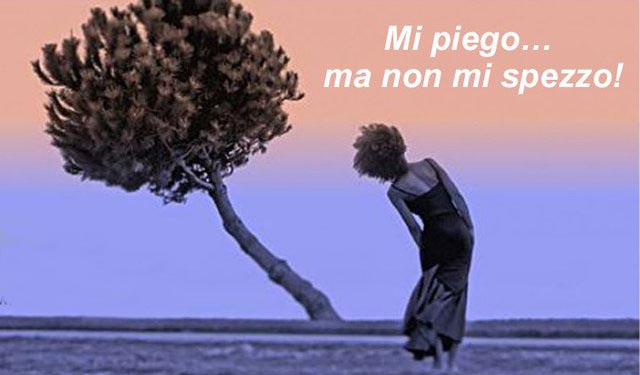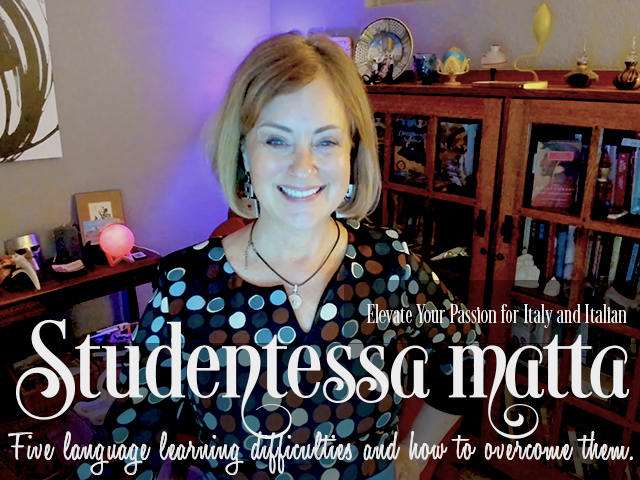
Sono contenta di presentarvi Elisabetta Maccani
la fondatrice di
Italiano con Eli TV!
I am happy to present to you Elisabetta Maccani, the fonder of “Italian with Eli TV!”
Elisabetta Maccani si occupa di formazione linguistica ad adulti stranieri da più di 10 anni. È un’insegnante di italiano certificata dall’Università Ca’ Foscari di Venezia e una NeuroLanguage Coach® accreditata da ICF (International Coaching Federation). Elisabetta è inoltre la fondatrice del Canale YouTube Italiano con Eli TV e della Pagina Facebook Italiano con Eli (@ItalianoConElisabetta), canali mediante i quali si dedica alla diffusione della lingua e della cultura italiana. Tutti i suoi video sono sottotitolati in italiano, spagnolo e inglese.
Elisabetta Maccani has been involved in language training for foreign adults for more than ten years. She is an Italian teacher certified by the Ca’ Foscari University in Venice and a NeuroLanguage Coach accredited by ICF (International Coaching Federation). Elisabetta is also the founder of the Italian YouTube Channel with Eli TV and the Italian Facebook Page Eli (@ItalianoConElisabetta), channels through which she is dedicated to spreading the Italian language and culture. All her videos are subtitled in Italian, Spanish, and English.
In un guest post Elisabetta dà ai lettori del blog Matta alcuni ottimi consigli per l’apprendimento della lingua italiana!
In a guest post, Elisabetta gives the Matta blog readers some great Italian language learning advice!
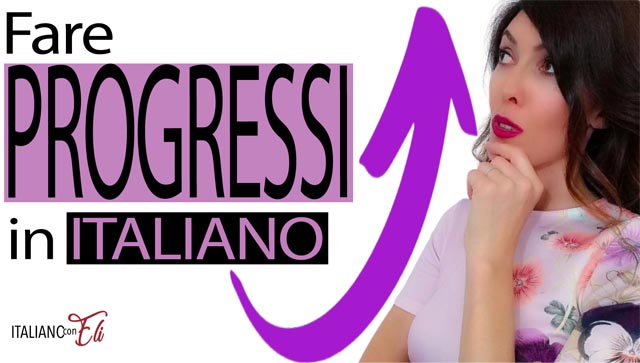
Sono Elisabetta e so che cosa vuol dire sentirsi bloccati.
Mi è successo molte volte.
I know what it’s like to feel stuck.
It has happened to me many times.
Io parlo due lingue straniere, lo spagnolo e l’inglese e posso dire che in entrambi i casi mi è capitato di avere l’impressione di non avanzare. La sensazione che ho provato spesso è stata quella di non riuscire a migliorare, di rimanere ferma nello stesso punto. O magari, ancora peggio, di tornare indietro. È mai possibile, mi dicevo, che nonostante tutti i miei sforzi io non avanzi?
I speak two foreign languages, Spanish and English and I can say that in both cases it’s happened to me… that feeling that I’m not moving forward. That feeling of not being able to improve, of being stuck and not being able to advance. Or perhaps, even worse, that feeling of slipping backward. How is it possible, I’d ask myself, that despite all my efforts I’m not getting any better?
Ora che per la mia attività professionale mi trovo dall’altra parte, ho notato queste stesse reazioni anche negli altri, ovvero nelle persone che vogliono migliorare il proprio livello di italiano. Ci sono dei momenti di forte frustrazione, nei quali tutto ciò che si fa ed è stato fatto sembra vano. In base alla mia esperienza, posso dire che il problema sta nella nostra idea di progresso.
Not that I’m on the other side of things, teaching Italian, I have noticed this same sentiment amongst my students who wish to improve their level of Italian. There are still moments of great frustration, in which everything that is being done, or has been done, seems in vain. In my experience, the problem lies in our perception of the idea of “progress.”
Pensaci un attimo. Qual è la tua idea di progresso?
Think about it for a moment. What is your ides of progress?
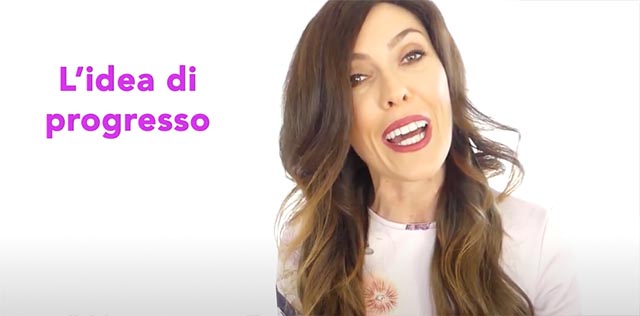
Per molti anni la mia è stata quella rappresentata dalla freccia a sinistra. Ho sempre creduto che si trattasse di una linea retta che procedesse progressivamente e senza ostacoli verso l’obiettivo stabilito.
For many years mine was represented by the arrow on the left. I have always believed that it was a straight line that proceeded progressively and without obstacles towards the established goal.
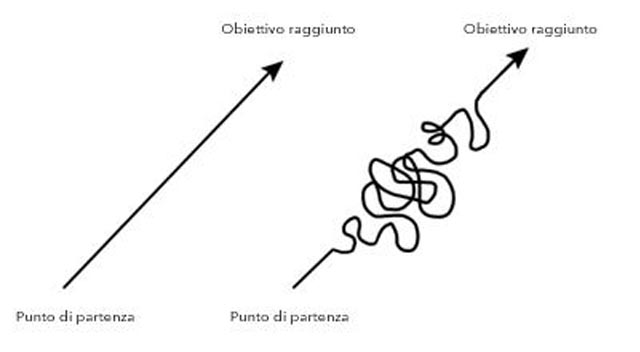
Ma il tempo, la mia esperienza come studentessa di lingue, di insegnante e ora di coach mi hanno portato a rivedere questa mia convinzione.
But over time, with my experiences as a student, a teacher and now as a language coach, I have revised this view.
Il progresso non è una linea retta. Il progresso procede a zig-zag. Si fanno tre passi in avanti e poi due indietro e dopo si fa un altro balzo in avanti per poi ritornare un po’ indietro e così via. Talvolta ci sono anche delle deviazioni, che magari ci sembrano vere e proprie perdite di tempo. Ma, anche se non ne siamo consapevoli, ci stiamo avvicinando sempre di più all’obiettivo finale.
Progress is not a straight line. Progress proceeds in a zig-zag fashion. You often take three steps forward and then two back and then you take another leap forward and then go back a little and so on. Sometimes there are also detours, which may seem like a real waste of time. But, even if we are not aware of it, we are getting closer and closer to the final goal.
Cercare di contrastare l’andamento irregolare del progresso sarebbe inutile. Molto più sensato è tenere presente come stanno realmente le cose e allontanarsi dalla nostra visione idilliaca.
Trying to fight against this irregular process of progress is useless. It makes much more sense to keep in mind how things really are and not get caught up in unrealistic fantasy.
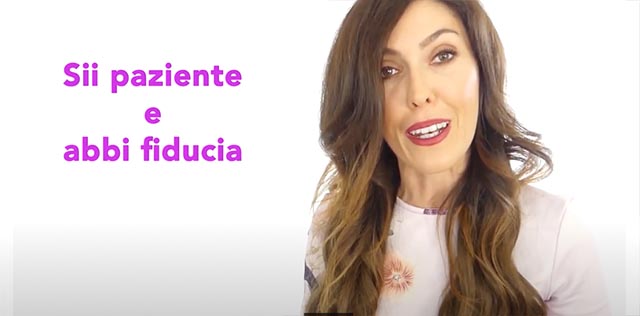
La strada che stai percorrendo e che è diretta verso il tuo sogno italiano sarà quindi impervia? Ti capiterà di inciampare? Forse finirai addirittura per terra? Certamente. È inevitabile. Ma ogni volta che ti succederà di vivere una di queste esperienze, sappi che paradossalmente sei sulla buona strada. Ti stai avvicinando sempre di più al tuo obiettivo.
Will the language learning road you are taking be a waste of time? Will the trip ever be over? Maybe you will crash and burn? Yes, perhaps. It is inevitable. But whenever you have one of these experiences, know that paradoxically you are on the right track. You are actually getting closer and closer to your goal.
Riconosci quello che sai fare e i progressi che hai fatto, quindi. Apprendere una nuova lingua è come un viaggio: i ritardi ci innervosiscono, ma gli incontri inaspettati e le nuove scoperte ci ripagano dell’attesa. Non trovi?
At times like this you must recognize what you have already accomplished and the progress you have already made. Learning a new language is like a journey: delays make us nervous, but unexpected encounters and new discoveries repay us for the wait. Wouldn’t you agree?
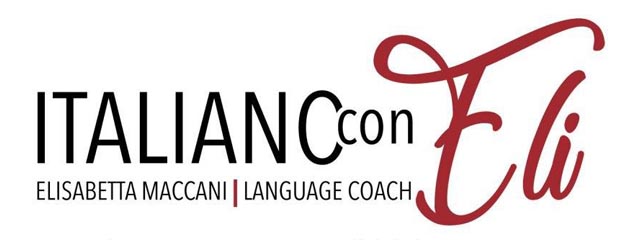
Se vuoi conoscere gli altri 9 elementi essenziali per imparare la lingua italiana in modo efficace, puoi scaricare gratuitamente la Guida The Essential 10 dal sito www.elisabettamaccani.com.
If you want to know the other 9 essential elements to learn the Italian language effectively, you can download the Essential 10 Guide for free from Eli’s website: www.elisabettamaccani.com
